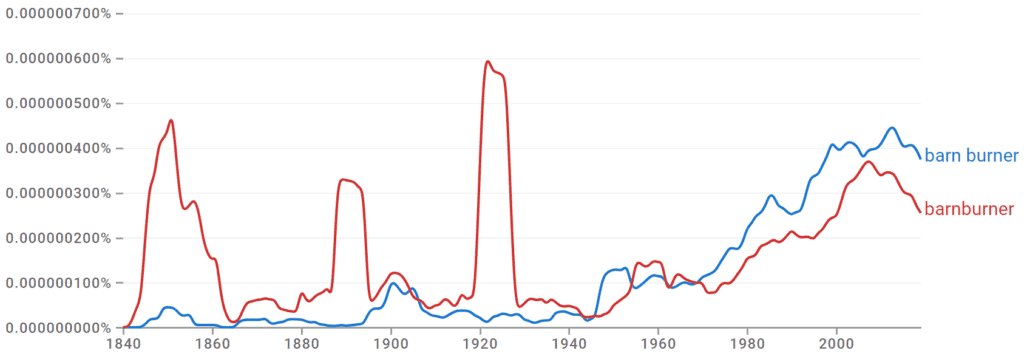Idiomatic words and phrases are colorful, figurative ways of adding detail and description to speech and writing. They are popularly used in all languages, but if you are unfamiliar with their use, they can be confusing when taken in a literal sense.
Most idioms have a literal origin that goes back hundreds, if not thousands, of years. Their use is often related to a modern action through allusion or a symbolic manner. Barn burner is a great example of an idiom that was first used in a literal sense approximately 200 years ago.
Let’s take a look at what a barn burner is and how to use it in modern speech and writing.
What Is the Meaning of a Barn Burner?

In a modern context, a barn burner is an event or person that is extremely exciting. Often, barn burner is a term that is applied to intense sporting events.
For example:
- That match between the Highlanders and Hurricane Force was a real barn burner.
- She was a real barn burner last night; her speech just about brought down the house!
Is Barn Burner One Word or Two?

As one word, Barnburner has sometimes been used in an informal manner. It also is the originating, literal usage of the word when referring to somebody who would burn a barn down for various reasons (more on this explanation below).
However, today, it is a two-word term. Using it as one word is considered incorrect and can cause confusion as well.
Is Barn Burner Hyphenated?
Today, barn burner is almost always rendered as two words. But it can be hyphenated when used as an adjective. Also, it is often augmented with the word real, as in a real barn burner.
For example:
- His barn-burning performance last night is sure to get him attention. In fact, I heard he was asked to audition for a future lead role.
Barn Burner Origins
The origin of barn burner is at least 200 or more years old. The original term barnburner was a name given to a Dutch farmer in a folktale who was willing to burn his barn down to get rid of a rat infestation. The farmer’s actions were considered radical and over-the-top, thus lending the term figuratively to mean an intense situation.
By the 1840s, barn burner was used to describe a progressive member of the New York State Democratic Party. These party members introduced the banning of slavery in the captured Mexican War territories, directly opposing the Southern Democrats.
When Martin van Buren ran for president as a Free Soil (Independent) candidate in 1848, the barn burners nominated him. This helped ensure the Democratic nomination would be defeated. In 1950, most of the barn burners joined the new Republican party.
Obviously, this was a rather exciting and radical movement and shaped the practice of political freedom of speech at the time.
In 1933, Robert Hendrickson documented the use of the term barn burner by American wildcat oilmen in his book “The Facts on File Encyclopedia of Word and Phrase Origins.” It was used to describe a large oil gusher or one that shot up into the sky.
Let’s Review

Originating from the extreme measures a Dutch farmer was willing to take to rid his barn of rats, a barnburner was originally described in a folktale. This action quickly lent itself to metaphorical situations, and the phrase barn burner promptly came to mean anyone or anything radical or exciting in nature.
For many years, it was used to describe members of quickly changing political factions during the shaping of American history. It also has been used to describe the gushers of the early oil booms.
Today, it describes an exciting person or event and is commonly heard in sports broadcasting.
Related Article:
